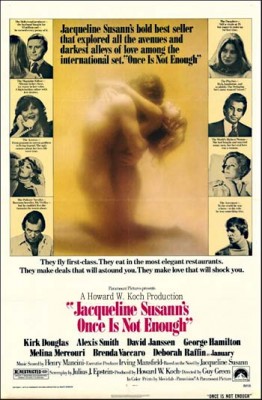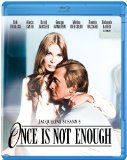| Reviews & Columns |
|
Reviews DVD TV on DVD Blu-ray 4K UHD International DVDs In Theaters Reviews by Studio Video Games Features Collector Series DVDs Easter Egg Database Interviews DVD Talk Radio Feature Articles Columns Anime Talk DVD Savant Horror DVDs The M.O.D. Squad Art House HD Talk Silent DVD
|
DVD Talk Forum |
|
|
| Resources |
|
DVD Price Search Customer Service #'s RCE Info Links |
|
Columns
|
|
|
Jacqueline Susann's Once Is Not Enough
The movie is a strange experience in 2013 terms. It's quite absurd, even laughable yet adult with explicit, adult conversation throughout but, conversely, all thumbs in its attempts to psychoanalyze its characters and explore the role of sex in their lives. Still, it was racy stuff in 1974 and in some ways seems pretty outrageous even today. The genre Susann pioneered eventually made its way to TV, as miniseries and weekly shows like Dallas and Dynasty, if in tamer, more homogenized forms. Hollywood movies being made to today are certainly just as bad as Once Is Not Enough, only now they're entirely juvenile in their concerns, catering as they do to the 18-24 demographic. Most of the cast in this is late middle-age, something you'd never see today outside The Expendables
Olive Films' Blu-ray, licensed from Paramount, is presented in a decent transfer with no extra features.
Mike Wayne (Kirk Douglas), once a celebrated, Oscar-winning film producer, is now washed-up (due mainly to ageism), unable to secure financing for his latest film project. He's called away to Switzerland, where his beloved, devoted daughter, January (Deborah Raffin), is finally recovering three years after a nearly fatal motorcycle accident.
Mike, concerned about his 20-year-old, a girl who has lived her entire life in luxury, agrees to a loveless but mutually beneficial marriage to millionaire heiress Deidre (Alexis Smith, playing a character based on Barbara Hutton), who in part uses Mike as a beard to hide her secret affair with Karla (Melina Mercouri), a long retired, reclusive movie star modeled after Greta Garbo. Mercouri, light years from Never On Sunday, is braless in her lovemaking scene with Smith but about as sexy as Lucille Ball in Mame.
January would just as soon live in poverty with Mike, but reluctantly agrees to go along with her father's relationship. However, Deidre is so controlling and pushy that she all but forces her virgin stepdaughter into a love affair with Deidre's nephew, shameless womanizer David Milford (George Hamilton), playing Warren Beatty (?).
Determined to be independent, January goes to work for man-eater Linda Riggs (Brenda Vaccaro), editor of a trend-setting women's magazine, and clearly inspired by Helen Gurley Brown. Together they meet Tom Colt (David Janssen), a Norman Mailer-type drunken lout with overemphatic masculinity issues. Linda wants to lay him (as Susann might have said) but Colt is attracted to the more innocent January, while she, with her father-complex, falls for him.
The movie has much camp value (watching this with an audience of receptive gay men could be very entertaining). The screenplay by Casablanca co-writer Julius J. Epstein has more than its share of howlers: "You just cut my balls off in front of my daughter!" Mike screams at Deidre. "I wanted it to look like a bordello," says David of his all-red bachelor pad, complete with the same automated curtains and round bed as Leslie Nielsen's Howard Hughes type in Harlow.
But the most outrageous lines go to Brenda Vaccaro's character, none more than this admonition to January: "I'll tell you, it would be a lot healthier if you just got it over with and went to bed with your father. Why don't you ask him? All he can do is say ‘No.'"
Vaccaro gives an entertaining performance, to be sure, one nominated for an Academy Award. And it's surely the only Oscar-nominated performance featuring the line, "You mean his dingle is like spaghetti?" referring to Colt's limp six-shooter.
(In its defense, the film's dialogue is dead-on at least once. When Linda invites January to write for her magazine and she counters that she can't write at all, Linda replies, "Neither can I! All you do is research. We have an entire staff of underpaid schmucks who do the writing!" Clearly, Arianna Huffington took notes.)
Janssen, with impressive wind-swept sideburns, suggesting an eagle in flight, does the best of the imitations. Anyone old enough to remember Mailer's fight-picking appearances on The Dick Cavett show and elsewhere will admire Janssen's Hemingway-wannabe.
The movie is undeniably slick, with good use of New York, Los Angeles, and Spanish locations. Henry Mancini's score is lush if unmemorable, and director Guy Green stages one critical scene near the end with much imagination, cleverly letting the audience in on an important story development before several main characters are aware of it.
This only-in-the-‘70s cast also includes Gary Conway as an astronaut (disappointingly, in recounting his exploits he fails to mention his adventures in the Land of the Giants), and Lillian Randolph (It's a Wonderful Life) as Mike's elderly black maid. Forties actress Trudy Marshall, Raffin's real-life mother, has a brief walk-on as book-signing customer.
Video & Audio
Filmed in 2.35:1 Panavision with lab work by Movielab, a long-defunct lab where many an original film ended up getting lost following its bankruptcy, Jacqueline Susann's Once Is Not Enough looks generally looks good if unspectacular while the mono audio, English only with no subtitle options, is also fine. No Extra Features.
Parting Thoughts
Definitely a film of its time, Jacqueline Susann's Once Is Not Enough is trashy and generally terrible, but far more enjoyable than Harlow (1965), a similar picture being released simultaneously by Olive. If campy ‘70s cinema appeals to you, this is just the thing. Recommended.
Stuart Galbraith IV is a Kyoto-based film historian whose work includes film history books, DVD and Blu-ray audio commentaries and special features. Visit Stuart's Cine Blogarama here.
|
| Popular Reviews |
| Sponsored Links |
|
|
| Sponsored Links |
|
|
| Release List | Reviews | Shop | Newsletter | Forum | DVD Giveaways | Blu-Ray | Advertise |
|
Copyright 2024 DVDTalk.com All Rights Reserved. Legal Info, Privacy Policy, Terms of Use,
Manage Preferences,
Your Privacy Choices | |||||||
















